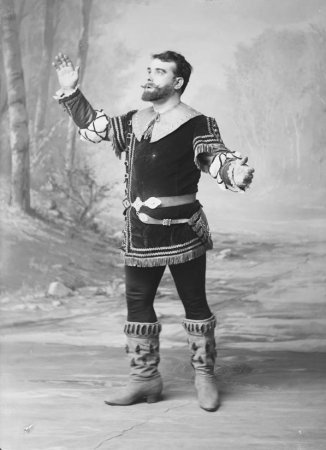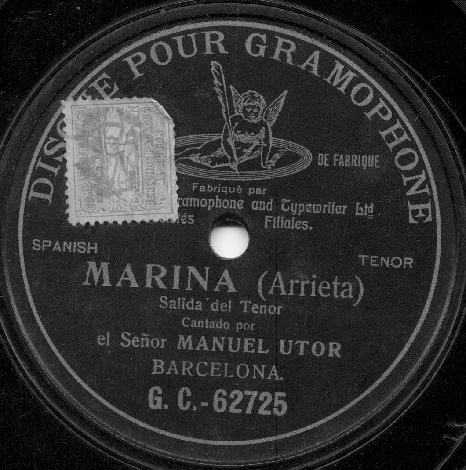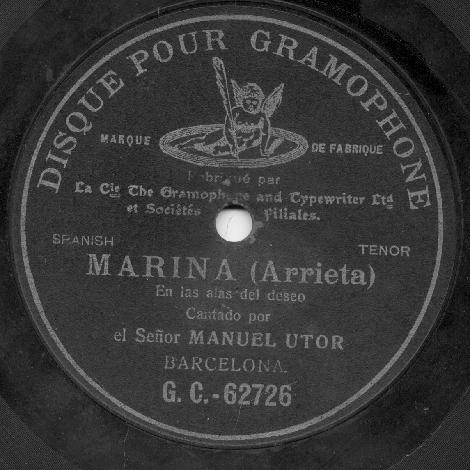Manuel UtorEl Musclaire
Manuel Utor i Mayor was an exponent of Barcelona's hoi polloi: almost illiterate, a boiler manufacturer first and then a burden bearer in the
port, he was nicknamed El Musclaire (mussels fisherman, in Catalan) because he also carried mussels to other city quarters with a
handcart, and sold them. His face was marked with smallpox, he had one glass eye as a result of a bar fight, and in 1895, another drunken bar
fight degenerated into a shootout, and Utor accidentally killed an innocent bystander with his gun. He was convicted to twelve years in prison,
but released for good behavior after six.
What set Utor apart from the misery of his milieu was his incredibly large and brilliant tenor voice; he was quite a tavern celebrity for his
singing of popular Catalan songs or zarzuela arias, in which he used to insert warm, long held, impressive high notes, called in
Barcelona pinyols (pinyols means pigeons in Catalan, a term also used for a singer's top notes). When he came home after serving his prison
sentence in Cartagena, his friends convinced him to try his luck as a singer. He had of course never learned music, but for some reason knew
the entire part of Jorge in Arrieta's Marina by heart; and as a 100 percent amateur, he made his debut in that part in 1901; he sang it
at the Teatre Gran Via in Barcelona and in several towns on the Catalan coast, but it's not clear where his debut took place (depending on
sources, either at the Gran Via or in the town of Sant Boi de Llobregat). It was, however, a failure, for lack of any musical education.
But he got the possibility to sing a few concerts in Barcelona in 1902, and there he was heard by an opera aficionado called Bern Janzen, a
Danish or Swedish businessman residing in Barcelona. Janzen took him up in his house. There Utor was taught proper reading and writing, he
learned some Italian, and he received vocal lessons. The one and only work he studied was L'Africaine, in Italian. It was a very
difficult task for him, he struggled with the Italian pronunciation as well as with the music, and was forced to go over everything many, many
times in order to memorize his part. Janzen talked with the Liceu impresario Bernis and the conductor Mascheroni about his discovery. After a
disastrous audition, Mascheroni told Bernis that Utor could not be presented to the subscribers. But Janzen was tenacious. He moved heaven and
earth and some of his business colleagues so as to get a Liceu contract for his protégé.
And at long last, Utor was scheduled to sing L'Africaine on January 25th, 1903. His supporters and friends filled up
the upper part of the house. The other artists participating included Mary d'Arniero, Delfino Menotti and Edoardo Mascheroni, while
Émile Cossira was standing in the wings to take over in case of a disaster. Utor
was trembling with fear. Cossira told him to go without looking at the public and just sing. The performance culminated at O paradiso.
The B flat was received tumultuously by his friends in the upper level of the house, while the rest applauded complacently. A voice from the
gallery was heard saying: It is a Gayarre. However during the duet with Selika,
things soured. Utor forgot the Italian text and replaced it by unrelated Catalan text. The soprano had a fit of hilarity. The performance
ended without the expected scandal, though, and the audience was even fond of Utor.
Utor having been kind of a popular hero in Barcelona, legends grew around him. One of them tells that he sang only this single performance at
the Liceu. Not true: he returned in December 1905 (as Radamès) and in January 1906 (as Vasco da Gama again, this time with no lesser partner
than Amélia Talexis).
Besides the Liceu, Utor sang in Barcelona at the theaters Gran Via, Nuevo, Bosque, Lírico, Català Romea, Condal, Novedades,
Tívoli, Prado Catalàn and Cómico: many performances of Marina, where he could show off his pinyols, many of
L'Africaine, but also La favorite, La Dolores, Lucrezia Borgia or Cavalleria rusticana, and even one world
premiere: I goti by Eduardo Viscasillas (Teatre Gran Via, April 1905). Utor also sang in Valencia, Zaragoza, Vic, Banyoles (where he
appeared in La tempestad, a work that he doesn't seem to have sung elsewhere), and even at the Teatro de la Zarzuela in Madrid (1908,
Marina, an excellent success).
Utor never spared his voice, and sang what would have been way too much for most other singers. On 12 February 1912, he sang a matinee double
bill of Cavalleria and Marina, and another Marina in the evening!
Another Utor legend is that he had a short career, only until about 1911. Nothing could be farther from truth! In 1911, Verdi's first Iago
Victor Maurel founded an opera company for the American Syndicate of Artists, supposed to tour the USA, and he hired Utor. Since the Syndicate
changed their mind and withdrew funding, the company faltered immediately on arrival in New York City, before it had given its first
performance, and Maurel turned tail and ran. So Utor was stranded in a city of a size unknown to him, without speaking one word of the local
language (English, that is). But used to surviving in dire conditions, he managed to sing in vaudeville, and eventually became a "singing cook"
at a musically inclined restaurant. Eventually, the Spanish consul took notice of him, and paid for his trip back to Barcelona. In 1912/13,
though, Utor actually toured America for many months – South America, this time, specifically Argentina and Uruguay.
Utor pursued his stage career as long as 1929; then he returned to singing in the cafés for Sunday afternoon's customers. He spent his
advanced age in Barcelona in a third-floor apartment on Calle Hospital.
On March 20th, 1939, at 74 years old, Utor being completely without resources applied to be admitted in the hospice Albá at the Casa
Provincial de Caridad. Utor died there on 1 July 1946 from a cerebral hemorrhage at 9.30 a.m. He had spent his last years on bed number 55 in
the common sleeping quarters number E.
Unfortunately for him, Utor was the perfect example that a great voice does not necessarily produce a great singer.
Barcelona, Teatro de Novedades, 4 February 1903, L'Africaine with Júdice, Gessler, Gnaccarini, Sorgi, Boldu, Oliver In Valencia, Utor spent the evening fighting the tempi set by the conductor. This created havoc in the communication between singers and orchestra.
Arbós, Teatro Arbosense, 22 December 1911, Marina with Puerto, Sanahuja, Pujol, Riba
G&T, Barcelona, about November 1902<> 7182F Marina (Arrieta): Costa la de levante 62725, Victor 5186 7183F Marina (Arrieta): En las alas del deseo 62726 7184F Marina (Arrieta): Al ver en la inmensa llanura del mar 62690, Victor 51022 7185F L'Africaine (Meyerbeer): O paradiso 52647 7186F Marina (Arrieta): Bien sabes tu 62691Source: Gesellschaft für historische Tonträger, Wien Reference 1: Almanaque del Diario de Barcelona para l'año 1904, page 94 I would like to thank Vladimir Efimenko for the recording. |


